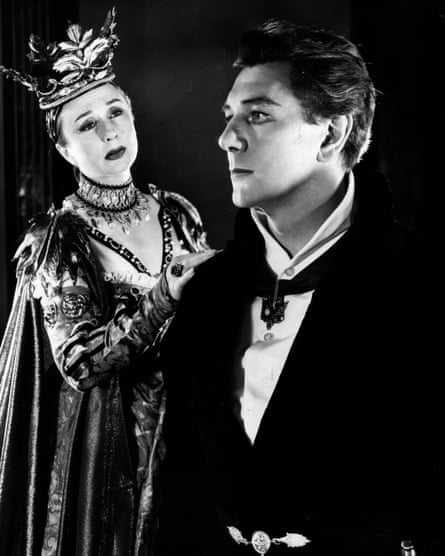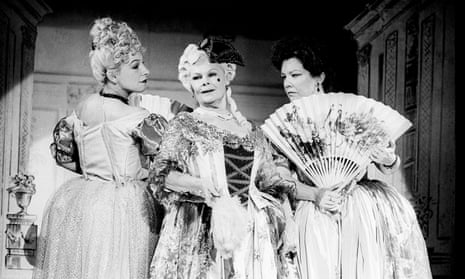Theatre is the most evanescent of arts. That may be one reason why so many people have sought to pin down its magic in words. But in choosing my favourite books on the subject, I have deliberately confined myself to the past 100 years. I have, however, included a wide range: fiction, biography, diaries, letters and lectures showing how theatre stimulates writers in different ways. I’ve excluded Shakespeare, since the territory is so vast, and books of reviews. But if anyone is impatient to read a collection of old clippings, my own selection of Guardian theatre pieces from 1992 to 2020, Affair of the Heart, is published by Methuen in October. So here, in reverse chronological order, are my top 10 books on the fugitive art.
1. Actress by Anne Enright
This brilliant novel is about a daughter’s quest for the truth about her mother, legendary Irish actor Katherine O’Dell. But the emotional journey is anchored in theatrical detail. We learn of Katherine’s beginnings with Anew McMaster’s touring company, of her mesmerising stillness on stage, of her ability to milk a curtain call (“that clearing of her gaze as though realising the audience had been there – oh my goodness! – all along”). Enright also pins down the penalties of fame: Katherine becomes a national icon through a TV ad for butter and, at 51, winds up stark naked in an avant garde production.
2. Tom Stoppard by Hermione Lee
Lee is best known for her biographies of Virginia Woolf, Edith Wharton and Penelope Fitzgerald, but she brings her capacity for exhaustive research and perceptive analysis to Stoppard and the result is highly revealing. By linking the plays and the life, she shows that Stoppard, often characterised as the ideas man of British theatre, is a complex romantic rather than a cerebral gymnast: works such as Jumpers, Arcadia and In the Native State pulsate with emotion. Lee also reminds us that, as a “bounced Czech”, Stoppard initially idealised his adopted country but now feels the need to write “obsequies for the England we have mislaid”.
3. Finishing the Hat by Stephen Sondheim
This is not only a collection of Sondheim’s lyrics from 1954 to 1981 but a critical commentary on them by their author. I can’t think of any theatre book that gives so clear a picture of the artistic process: Sondheim reveals that his greatest hit, Send in the Clowns, was written in short breathy phrases, made up of questions rather than statements, because its original performer, Glynis Johns, was unable to sustain a note. Sondheim is sometimes harsh on fellow lyricists but this is still the one indispensable book about musical theatre.

4. Secret Dreams: A Biography of Michael Redgrave by Alan Strachan
After Olivier, Redgrave was my favourite actor: even at 50, the best Hamlet I ever saw, a great Antony, a peerless Uncle Vanya. Alan Strachan’s biography, relating Redgrave’s genius for playing divided characters to his bisexuality, does justice to his complexity. But it also shows how he brought meticulous research and a sophisticated intelligence to everything he did: before playing Shylock at Stratford, Redgrave explored the Amsterdam synagogues and he theorised about his craft in a stimulating set of lectures, The Actor’s Ways and Means, that quoted from Longinus, Aristotle and Diderot.
5. Mrs Jordan’s Profession by Claire Tomalin
Tomalin’s book is a fascinating study of Dora Jordan who, alongside Mrs Siddons, dominated the Georgian stage. It is also a slice of history showing how a woman of independent spirit was maltreated by the royal establishment. Mrs Jordan’s profession was acting: she played Rosalind, Viola and Imogen, appeared in scores of forgotten comedies, was adored by Coleridge, Lamb and Hazlitt, who wrote that “her smile had the effect of sunshine”. But, by the age of 45, she had borne 13 children, 10 of them to the Duke of Clarence who later became William IV. What is staggering is her devotion to her profession, her physical resilience and her ability to rise above her ultimate rejection.
6. Joan’s Book by Joan Littlewood
A statue of Joan Littlewood stands outside the Theatre Royal Stratford East but generations have grown up that never saw this pioneering director’s work. Reading her bulky memoir you get an idea of what she achieved: her beginnings in agitprop theatre in Manchester, her postwar founding of Theatre Workshop, which combined political passion and music-hall gaiety and the company’s dissolution as the commercial theatre plundered its talents. Joan’s memoir is not always reliable but it is engrossing and reminds us that this radical pathfinder was a stickler for form. After Shelagh Delaney’s success with A Taste of Honey, Joan tells her to go away and read Ibsen: “Playwriting is a craft, not just inspiration.”
7. Peter Hall’s Diaries: The Story of a Dramatic Battle
This is a dangerous book. Dip into it for 10 minutes and you’ll find yourself still reading an hour later. That is because Hall, covering the first half of his 15-year tenure as director of Britain’s National Theatre from 1973 to 1988, is incredibly candid. He records his battles with the media, the Arts Council, the backstage unions, but also the instant acceptance of the NT by the public. Having created the RSC and brought the National into being, Hall had a massive impact on British theatre. But he emerges from these diaries as a vulnerable workaholic and as someone of unusual prescience. He has a telling entry for 2 June 1975: “God help us if the referendum goes against Europe.”
8. The Empty Space by Peter Brook
This is arguably the most influential theatre book of modern times. Generations of students and practitioners have absorbed Brook’s division of theatre into four categories – deadly, holy, rough, immediate – but this is also a book for the playgoer. Time and again I am struck by Brook’s practical wisdom: that high prices often deter young theatregoers, that a permanent company is doomed to deadliness without a philosophy, that what remains after a performance is a central image. Brook says at the end that his book is already out of date: I’d say it is as topical as ever.
9. Ellen Terry and Bernard Shaw: A Correspondence
Reading other people’s letters is always fun: especially when they are as vibrant, witty and impassioned as those written by Shaw and Terry from 1892 to 1922 (they weren’t published until 1931, which is why they don’t breach my 100-year rule). Shaw in those years moved from militant critic to established dramatist: Terry was, for much of the time, the leading light of Henry Irving’s Lyceum theatre. That animates much of the correspondence, since Shaw felt Irving squandered her talents: “He is an ogre who has carried you off to his cave and now Childe Roland is coming to the dark tower to rescue you.” Terry, for her part, was loyal to Irving but adored Shaw – which is what makes these letters irresistible.
10. The Good Companions by JB Priestley
Priestley’s first popular novel has had a long life: it has been turned into a stage play, a movie and a musical. You can see why it has lasted so long: it’s the picaresque story of three people whose lives are magically transformed when they rescue a stranded pierrot-troupe. If it remains one of the best ever theatre novels, it is because it sets the self-fulfilment of its central trio against a backdrop of economic depression. You could see it as a fictional variant on Priestley’s famous travel book English Journey.
Affair of the Heart is published by Methuen 0n 21 October. Michael Billington will be in discussion with Sandy Walsh at Crazy Coqs, Brasserie Zedel, London, on 25 October at 7pm.
